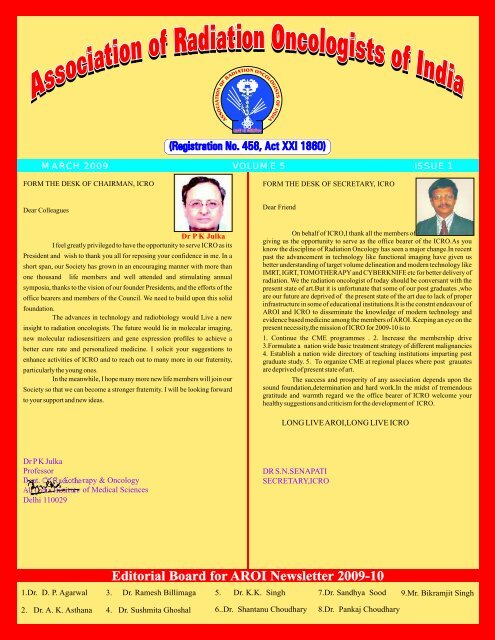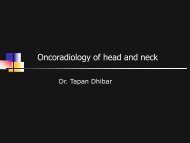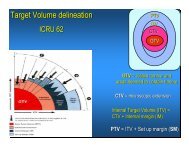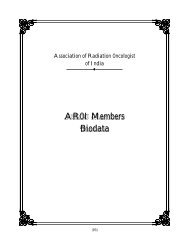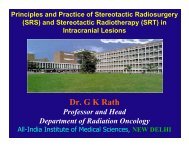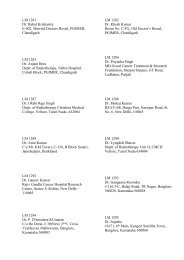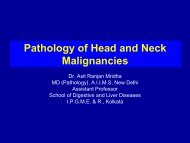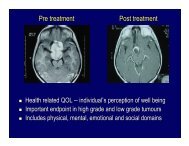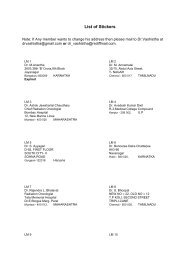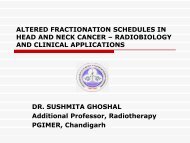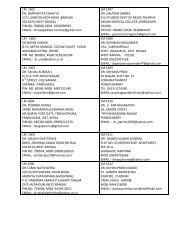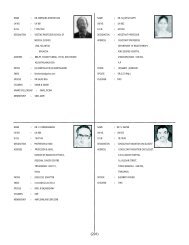Download - Aroi.org
Download - Aroi.org
Download - Aroi.org
Create successful ePaper yourself
Turn your PDF publications into a flip-book with our unique Google optimized e-Paper software.
MARCH 2009 VOLUME 5 ISSUE 1<br />
FORM THE DESK OF CHAIRMAN, ICRO<br />
FORM THE DESK OF SECRETARY, ICRO<br />
Dear Colleagues<br />
Dear Friend<br />
Dr P K Julka<br />
I feel greatly privileged to have the opportunity to serve ICRO as its<br />
President and wish to thank you all for reposing your confidence in me. In a<br />
short span, our Society has grown in an encouraging manner with more than<br />
one thousand<br />
life members and well attended and stimulating annual<br />
symposia, thanks to the vision of our founder Presidents, and the efforts of the<br />
office bearers and members of the Council. We need to build upon this solid<br />
foundation.<br />
The advances in technology and radiobiology would Live a new<br />
insight to radiation oncologists. The future would lie in molecular imaging,<br />
new molecular radiosensitizers and gene expression profiles to achieve a<br />
better cure rate and personalized medicine. I solicit your suggestions to<br />
enhance activities of ICRO and to reach out to many more in our fraternity,<br />
particularly the young ones.<br />
In the meanwhile, I hope many more new life members will join our<br />
Society so that we can become a stronger fraternity. I will be looking forward<br />
to your support and new ideas.<br />
On behalf of ICRO,I thank all the members of AROI and ICRO for<br />
giving us the opportunity to serve as the office bearer of the ICRO.As you<br />
know the discipline of Radiation Oncology has seen a major change.In recent<br />
past the advancement in technology like functional imaging have given us<br />
better understanding of target volume delineation and modern technology like<br />
IMRT, IGRT, TOMOTHERAPY and CYBERKNIFE etc for better delivery of<br />
radiation. We the radiation oncologist of today should be conversant with the<br />
present state of art.But it is unfortunate that some of our post graduates ,who<br />
are our future are deprived of the present state of the art due to lack of proper<br />
infrastructure in some of educational institutions.It is the constnt endeavour of<br />
AROI and ICRO to disseminate the knowledge of modern technology and<br />
evidence based medicine among the members of AROI. Keeping an eye on the<br />
present necessity,the mission of ICRO for 2009-10 is to<br />
1. Continue the CME programmes . 2. Increase the membership drive<br />
3.Formulate a nation wide basic treatment strategy of different malignancies<br />
4. Establish a nation wide directory of teaching institutions imparting post<br />
graduate study. 5. To <strong>org</strong>anize CME at regional places where post grauates<br />
are deprived of present state of art.<br />
The success and prosperity of any association depends upon the<br />
sound foundation,determination and hard work.In the midst of tremendous<br />
gratitude and warmth regard we the office bearer of ICRO welcome your<br />
healthy suggestions and criticism for the development of ICRO.<br />
LONG LIVE AROI,LONG LIVE ICRO<br />
Dr P K Julka<br />
Professor<br />
Dept. Of Radiotherapy & Oncology<br />
All India Institute of Medical Sciences<br />
Delhi 110029<br />
DR S.N.SENAPATI<br />
SECRETARY,ICRO<br />
1.Dr. D. P. Agarwal<br />
Editorial Board for AROI Newsletter 2009-10<br />
3. Dr. Ramesh Billimaga 5. Dr. K.K. Singh 7.Dr. Sandhya Sood<br />
9.Mr. Bikramjit Singh<br />
2. Dr. A. K. Asthana<br />
4. Dr. Sushmita Ghoshal<br />
6..Dr. Shantanu Choudhary<br />
8.Dr. Pankaj Choudhary
FROM THE EDITORIAL BOARD<br />
On behalf of the Editorial Committee, I would<br />
like to convey my gratitude to President,<br />
Secretary and the members of the Executive<br />
Committee for giving us the responsibility to be<br />
Editors of this prestigious Newsletter. It gives me<br />
immense pleasure to be associated with AROI<br />
News Letter and completing two years of AROI Newsletter<br />
publication. It would be my pleasure to be associated with this AROI<br />
Newsletter in future also.<br />
We welcome short clinical reports, case reports and<br />
preliminary results of ongoing clinical trials from the members of<br />
AROI, to be published in this news letter. I thank you all for your<br />
support in making this Newsletter enriched with information and<br />
academic knowledge in the last two years.<br />
We will try our best to make this short journal improve its<br />
quality further and be a promising newsletter in upcoming future also. I<br />
thank you all once again for making me associated with AROI<br />
Newsletter and look forward to be of valuable service in near future<br />
also<br />
.<br />
Dr. R. K. Vyas,<br />
Editor in chief,<br />
AROI Newsletter.<br />
BRECON 2009<br />
Photo: Inauguration of BRECON 2009<br />
Wish you all a Happy Holi and Vikrama New Year<br />
(Indian). The Specialty of Radiation oncology<br />
has gone through a sea change in India keeping<br />
pace with research & development at<br />
international level.Still, individualisation of<br />
disease behavior inpatients is as old as the<br />
science. The Vivid & Variedexperience in the vast sea of clinical<br />
material in the country has been perceived all around the world. We<br />
must & have to share the miracles and wonders of experience through<br />
this news letter which had already made it’s importance and presence<br />
felt in the field of radiation oncology. A brigade of young radiation<br />
oncologist is bubling with enthusiasm. In future, the specialty will be<br />
more brightened and strengthened by them.<br />
I welcome you all on this boat of scientific journey through<br />
waves of knowledge and experience by all concerned.<br />
With best wishes,<br />
Your’s Sincerely<br />
(Dr. D.P.Agarwal)<br />
CELEBRATIONS<br />
The 13th Annual Conference of the Breast Cancer Foundation-India<br />
(BCF-India) BRECON 2009 was held at Meenakshi Mission Hospital and<br />
Research Centre (MMHRC) Madurai, Tamilnadu on the 7th & 8th of March 2009.<br />
MMHRC and AROI TN & PONDY chapter jointly hosted the meeting. Around 250<br />
delegates from all over the country attended the conference. The two days session<br />
included lectures on Recent advances in Molecular Biology, Pathology, Imaging,<br />
and management of Early, Locally advanced and Metastatic breast cancer<br />
Cancer Vijay Diwas 2009 & Regional Workshop on "Prevention and early<br />
detection of Cancer " was celebrated at Padhar Hospital, Betul, Madhya<br />
Pradesh. Dr. KA Dinshaw was the Chief guest and Dr. Moni A. Kuriakose was<br />
the guest of honour for the occasion. (courtesy: Dr. Pankaj Chowdhary)<br />
from eminent speakers. Breast conservation surgery and Breast implants were demonstrated live. Earlier Dr Praful Desai Professor Emeritus Tata Memorial Hospital Mumbai<br />
delivered the Keynote address. Dr.V.N.Rajasekaran Medical Director MMHRC welcomed the gathering.The conference was inaugurated by Dr. Andal Dean Home Science<br />
College, Madurai. Dr. L.V.K.Moorthy TN State IMA president released the Souvenir. Dr. J.K. Singh Secretary of BCF- India read the Secretary report.<br />
Dr. Sanjay Sharma President of BCF- India gave the Presidential address.Dr. M.K. Mahajan Secretary General BCF- India addressed the gathering. Dr. S<br />
Parameswaran Vice President BCF- India Spoke.Felicitations were offered by Dr. S. Alex A Prasad Secretary AROI TN & Pandy Chapter, Dr. G. Amarnath President AROI TN<br />
& Pondy chapter Organizing secretary and Convener scientific committee. BRECON 2009, Dr.Rohini Sridhar Director of Medical Services Apollo Speciality Hospital<br />
Madurai, Dr. K. S. Kirushnakumar Organizing Secretary BRECON 2009 proposed the vote of thanks.BRECON – 2009 also conducted a free Cancer screening camp for women<br />
to
ONCON-2009<br />
It is a matter of immense pleasure for us to inform you that<br />
st<br />
SEAROC Cancer Center has recently <strong>org</strong>anized its 1 International<br />
th th<br />
conference on 24 – 25 January 2009 at S.M.S. Convention Hall, Hotel<br />
Rambagh Palace, Jaipur. The specialists not only from all over the India<br />
but eminent cancer doctors from New York, USA were also participated<br />
in this conference.<br />
Hon’ble Health Minister, Govt. of Rajasthan - Mr.<br />
Aimaduddin Ahmed urf Durru Miyan was the chief guest of this<br />
conference. The special guests of this inaugural function were Mr.<br />
Pradyumn Singh (former finance minister) and DR. P.P.S. Mathur (Vice<br />
chancellor, University of Rajasthan Medical Sciences).Eminent<br />
specialists from all branches of Oncology from India and abroad like<br />
Dr. Ashwath Narayan (New York, USA), Dr. Suresh Jhanwar (New<br />
York, USA). Dr. G.K. Rath (AIIMS, New Delhi), Dr. R.K. Vyas (Gujrat<br />
Cancer Center), Dr. S.H. Advani (Breech Candy Hospital, New Delhi),<br />
Dr. P.B. Desai (Formar Director, TATA Memorial Hospital, Mumbai),<br />
Dr. Kiran Kothari (Gujrat<br />
Cancer Center, Ahmedabad), Dr. J.P. Agarwal (Tata<br />
Memorial Hospital, Mumbai), Dr. A.K. Anand (RGCI, New Delhi), Dr.<br />
Purvish Parikh (Mumbai), Dr. L. Sarangi (Railway Hospital, Jodhpur),<br />
Dr. Col. R. Rangarao (RGCI, New Delhi), Dr. B.K. Smruti ( Bombay<br />
Hospital, Mumbai), Dr. P.P. Bapsy (Bangaluru), Dr. Vijay Ahuja<br />
(Manipal Cancer Institute, Bangaluru), Dr. Dinesh Singh (Pushpanjali<br />
Cancer Institute, New Delhi) delivered the lectures and shared their<br />
experiences.Experts covered all the three modalities of cancer<br />
treatment and also shared their own views on genetic counseling, PET<br />
Scan and other new dimensions in tumour markers and other<br />
diagnostics tools.<br />
th<br />
The scientific session was started on 24 March 2009<br />
(Saturday) with Key note lecture of Dr. Purvish Parikh on Transforming<br />
cancer management….Can we make a difference???, which was<br />
followed by lectures of Dr. Rajesh Mistry – Heterogenous opacity on<br />
chest X-Ray – How to proceed?, Dr. B.K. Smruti – Changing paradigm<br />
in lung cancer management (chemotherapy to targeted), Dr. D.C. Doval<br />
– Small Cell Lung Cancer, Dr. Kiran Kothari - Current and future in<br />
minimal invasive surgery, Dr. Dinesh Singh – Transitioning from 3D<br />
CRT to 4D IMRT and the role of image guidance in lung carcinoma.<br />
This session was followed by panel discussion. The moderator was Dr.<br />
Hemant Malhotra. After the panel discussion Dr. Simi Bhatia presented<br />
her lecture on Pathologist and Oncologist : Hand in Glove, and Dr. Lili<br />
Verma presented on role of Amphotericin B Formulation in Fungal<br />
Infection in Malignancy.The second session was started with Dr.<br />
Topiwala’s Key note lecture on Redefining the role of surgery in Head<br />
and Neck Cancer – Organ Preservation. This lecture was followed by<br />
lectures on Interections of biological target agents and novel<br />
chemotherapy with radiation – Dr. Col. R. Rangarao,<br />
Managing the acute side effects of concurrent chemo-radiation – Dr.<br />
J.P. Agarwal, New Horizon in Radiotherapy in Head and Neck Cancer<br />
with Special reference to IGRT/IMRT – Dr. Ashwath Narayan, IMRT in<br />
Head and Neck: An Indian experience – Dr. A.K. Anand. This scientific<br />
session was followed by Panel discussion. The moderator was Dr. Vijay<br />
Haribhakti.<br />
th<br />
The next day (25 January 2009) was started with Key note<br />
lecture on Status of Oncology services in India…. Past, present and<br />
future, presented by Dr. G.K. Rath, which was followed by radical to<br />
conservation – paradigm shift in surgical management of breast cancer<br />
– Dr. A.K. Diwan, Role of genetics in Oncology and Genetic<br />
counseling in breast cancer – Dr. Suresh Jhanwar, In defence of cure:<br />
The arguments in favor of using radiotherapy in breast cancer – Dr.<br />
Ashwath Narayan, Advanced in targeted treatment in Breast<br />
Cancer Dr. Sunil Gupta, Management of Triple Negative Breast<br />
Cancer – Dr. S.H. Advani, What’s new in hormonal management of<br />
breast cancer – Dr. P.P. Bapsy. The panel was moderated by Dr. A.K.<br />
Vaid, followed by PET and CT Scan Fusion; Is it the right time to<br />
integrate with treatment decisions, P.S. Choudhary, Status of molecular<br />
targeted therapy in current oncology practice – Dr. Puneet Gupta.<br />
The second half session was started with the lecture of Dr.<br />
M.M. Mahajan on Cancer cervix; Advances in Radiotherapy<br />
techniques and standard of care which was followed by Brachytherapy;<br />
Current status in Gynaecological Cancers – Dr. R.K. Vyas, Gestational<br />
Trophoblastic Tumour – Dr. T.P. Sahoo, Current Status of<br />
chemotherapy in ovarian cancer – Dr. J.S. Shekhon, Management of<br />
abdominal and pelvic sarcoma : A bird’s eyeview – Dr. Sant P. Chawla,<br />
Controversies in management of endometrial carcinoma – Dr. Vijay<br />
Ahuja. Session was completed with Panel discussion. The moderator<br />
was Dr. Meeta Mankad.<br />
A doctor patient interaction session was also held there on<br />
th<br />
25 Jan. 2009 2:00 to 4:00 p.m. In this session the patient and general<br />
public asked their questions about cancer and the doctors resolved the<br />
queries. Registration for this session was totally free for general public.<br />
There was huge response from public who participated very<br />
actively.About 630 delegates participated in this conference. All the<br />
delegates and speakers express their positive views regarding right<br />
blending of all the specialties of oncology and topics covered. Every<br />
participants felt that it is the need of hour to manage the patients in<br />
totality rather than in fragmented way.
The Quality Control in Radiation Oncology Teaching: Time for Introspection<br />
Dr. Manoj Sharma<br />
The National Board of Examinations of the recent years that<br />
included all; the Thesis review of the candidate , the Theory, Practical and<br />
Viva Voce have brought several facts to the light that need urgent and<br />
earnest attention of both - the students and his teacher. With the view of the<br />
welfares of the student, the teacher ,the institution and hence the patients in<br />
mind and without wasting time and waiting for more data to pour in , author<br />
feels that it is his pleasant responsibility to highlight these issues.The fact is<br />
that country needs the quality and quantity both of very good radiation<br />
oncologist. An oncologist with radiation therapy as his primary degree that<br />
can be compared at par with the DM and M.Ch degree holders that are<br />
produced in the Centers of Excellence in the colleges of oncological<br />
sciences .It will not be exaggeration to summarise it in one sentence that<br />
“the teachers are not teaching and students are taking short cuts”. Many<br />
of the readers may have their own reasons not to agree with what is being<br />
written in the following paragraphs but the matter of fact remains<br />
unchanged. How teachers are not teaching and what are the short cuts taken<br />
by the students shall be discussed later. Through a series of teleconferencing<br />
and candidate to candidate interaction it was inferred that we have to find<br />
whether “the horse is at the fault or the rider is at the fault or both are at<br />
fault”. During the thesis reviews and the practical examination all these<br />
factors came to light and that shall be elucidated for the benefit of the<br />
students. This could prove the right opportunity for an introspection that<br />
was never given before to the teacher.<br />
To begin with the thesis / dissertation writing: In most of the<br />
defective or rejected or resubmission cases it was very clear that the defect<br />
was with the teacher “the horse”. One can always question as to why and<br />
how the teachers( supervisor in this case) has not been interacting with the<br />
student or why he has not supervised his work closely? Why the facts and<br />
the fundamentals of the randomized trials were not known either to the<br />
teacher or to the student .So was with the state of mind for statistical analysis<br />
and hence: In many cases there was a total fraudulent fabrication, so<br />
grotesque it was that the master chart revealed the truth and therefore that<br />
fabrication was not deniable.In one case the master chart was never prepared<br />
despite the request and this was apparently because the thesis was not done<br />
as per the tenets of scientific research. In a similar presentation the first<br />
application of concomitant brachytherapy was done at 10 Gy teletherapy<br />
dose in “a previously unexposed to chemotherapy” patients of stage III Ca.<br />
Cx..!!! Candidate did not even refer to the work carried out at PGI<br />
Chandigarh. This also brings to a very serious question addressed to the<br />
senior oncologists of country, Radiation oncologists in particular. And that is<br />
as to how and why<br />
1. They have not been able create a reliable statistics of<br />
radiotherapy patients that the candidate can quote as a reference and<br />
2. Why enough of awareness is not there about the genuine work<br />
already done in that particular field by some Doyens and some grassroots<br />
workers in this country.<br />
The very introduction of the thesis starts as quotes and data from the<br />
literature of developed countries. If the Indian cancer patient population is<br />
the base of thesis then how can the biological, socially and economically<br />
different human species that are backed with altogether different medical<br />
infrastructure be compared for the work that is being carried out in India?<br />
That too with all its short comings in i-onco-pathology, virtually non<br />
existent dedicated onco-pathology in most of the institutions.ii-follow-up<br />
systems that directly relates to poor literacy and awareness levels and iiidismal<br />
therapeutic infrastructures that leads to ruthless long waiting lists<br />
even for the treatment of cancer, disturbing research protocols in many<br />
institutions.Some how demographic statistics of the country is not quoted<br />
even though there is a National Cancer Registry that covers large areas of the<br />
country’s cancer population and comes out with regular reports. This<br />
“Indegenecity” is not the priority and is not quoted often. This has been<br />
seen in thesis related to chemo radiation or concomitant tele-brachyradiation<br />
in cervix.The randomization in order to strike proper balance between two<br />
groups was totally lacking and removal of bias was not even known to the<br />
candidate. There are theses where patients treated over a period of time were<br />
segregated in two groups and then it was garnished with usual headings of<br />
“Aims and Objectives” , “review of literature” and hence discussion based<br />
on these assembled statistics was presented as thesis. The master chart is still<br />
awaited to consider the acceptance or rejection of the thesis . An expert.<br />
commented that “ In first place if they have one( the master chart )<br />
then only they can send! Retrospective analysis on the patients treated by<br />
some one else or others in the department doesn’t make a thesis. The very<br />
purpose of dissertation is to show the evidence of the clinical work one has<br />
done on the patients during his post graduation training. Undoubtedly it is<br />
serious issue and our concern too, that the candidate should be given more<br />
time to do thesis, minimum of three years instead of two years .This is<br />
especially so in the subject like oncology that is heavily dependent on<br />
survival or response rate results.There are other thesis that had a very small<br />
series of that particular type of cancers and hence does not conform to the<br />
basics of statistical analysis that shall take the thesis to its logical conclusion.<br />
In such a situation a proper site should be chosen that have abundance of<br />
patients in that region or the hospital. The biological behavior based<br />
significance of the concept of sites as per ICD is lost somewhere .Often a<br />
thesis is done as combined head and neck cancers that will include 2-4 cases<br />
of each anatomic sites having different biological behavior and treatment<br />
related response and reactions!<br />
Most of the thesis does not describe the methodologies of follow<br />
up in their institution or for the cases they have taken for the study. “Lost to<br />
follow up” although sounding magical reflects cheaply on the standards of<br />
endeavors of that institution, its commander and the candidate.This is also<br />
under serious consideration, specially for the candidates of the private<br />
hospitals that they get sufficient times to work for their dissertation and
clinical pursuits instead of devoting most of the time for the<br />
oncologist’s ( the teacher in this case)private practice pursuits. A practice<br />
that involves lots of hospitality and “Personalized care and touch” and<br />
also institutional pursuits of man power adjustment in form of posting<br />
the post graduates of radiation oncology in non stop causalities duties<br />
etc.The candidate has to be aware of distractions that are there in the<br />
social life and respect the traditions of this greatest of all professional<br />
ethics. Especially so when a comparison with the post graduates of other<br />
labor intensive specialties like cardio ,neuro or gynec for that matter.<br />
The teachers have to take teaching seriously. It is very clearly<br />
revealed from the performance of the candidates and during interaction<br />
with them .It is on record that barring very few illustrious institutions like<br />
PGI Chandigarh, IRCH AIIMS, CMC Vellore and alike the teaching<br />
programmes are dismal in most of the institutions. The revelations during<br />
these interactions by the candidates itself is the testimony to this fact.<br />
The Short Cuts<br />
There is no clear-cut serious compliance to the programmes to the<br />
teaching schedule, both by the teacher or by the candidates. Going for<br />
fellowships or for meetings is an easy excuse by many a faculty who devote<br />
lesser time for teaching Programmes that make the teaching comprehensive<br />
and exhaustive are<br />
1-Lectures, that also includes lectures by the invited speaker and<br />
luminaries in their fields.<br />
2-Seminars, that should also include the participation in onco topics<br />
in other related specialties such as surgery, medicine, gynae<br />
and ENT.<br />
3- Journal clubs<br />
4-Clinical presentation,<br />
5-OPD teaching,<br />
6-Combined clinics with other specialties, Cancer Board- as made<br />
possible in many institutions.<br />
7-Live Operation theatres observations on surgeries of malignant<br />
disease that have been handled earlier by radiotherapy or are<br />
going to be handled by radiotherapy<br />
8-Brachytherapy demonstrations,<br />
9- TPS explorations.<br />
10-Chemo-radiation indoor care .<br />
11- Higher level Gadgetry experience on IMRT, IGRT, Cyberknife<br />
12- Molecular oncology etc. etc.<br />
These fundamentals of teaching are either non-existent or<br />
merged with each other or at its worst don’t happen as its necessity is not felt<br />
by the faculty and student both. Excuses and postponements are order of the<br />
day while “eat or drink parties” are those oft-cherished wishes that are<br />
never missed. There is all the time available for these non conducive<br />
distractions on this earth !<br />
In some places such social get together get an apparel of approval<br />
called Radonco Monthly CME meetings . A post drink-dinner scenario<br />
leaves no doubt about the ill effects of such fraternization that make<br />
substandard post graduate degree holders and hence on the examination<br />
results .<br />
This gives a wrong signal to the candidate that to get through in<br />
the examination the dedication and hard work can be replaced by appeasing<br />
the superiors by otherwise methods (“eat or drink parties”). At the time of<br />
final examination the invisible pressure shall work on the internal who<br />
often navigates the results with due influence on the friendly external that<br />
he only has power to call. It should be the power of the knowledge and a<br />
track record of the candidate that should be merit and not the donkeys<br />
years he has put in the department. The days and hours of which had greater<br />
percentage in “appeasing technologies” rather than learning of<br />
“oncological technologies”. This becomes a miserable site when<br />
candidates from such work culture come to appear in a “Bench Mark”<br />
examination where the examiners are of different regions of the country and<br />
have nothing to do with fraternizing culture. In some exemplary cases the<br />
candidate that was passed by the same examiner in M.D. failed miserably in<br />
“Bench Mark Examination”.<br />
The Attempts Made In Order To Raise The Standards of the<br />
Radiation Oncologists of The Future.<br />
It is indeed intriguing to see that the pace at which the developments have<br />
taken place in radiation oncology and it’s “Vicinity Sciences” the same<br />
pace has not been found in the revision of the syllabus. Concerned people<br />
have not even bothered to look into the syllabus renewal at all. Just through<br />
an un-coded and un-recorded passwords the topics are given in question<br />
papers with pre-understood notion that candidate is expected to know the<br />
nuances and recent advances .<br />
Here the flaw comes when the institutional heads have not bothered<br />
either to upgrade the department – while putting the blame on the Govt. or<br />
the governing body of the institution. In many instances they have not<br />
observe the minimal basic requirements as per MCI norms to conduct a<br />
post graduate course. In some cases of accreditation the dubious methods<br />
used by the institution to reflect he teaching and infrastructure facility has<br />
added to the production of substandard quality of students. The degrees are<br />
doled out without having any facility of brachytherapy and even prolonged<br />
shut down of teletherapy machines due to medical physicist crisis of recent<br />
years . Presence of Simulator, mould room workshop ,research<br />
infrastructures and quality control calibration facilities is a far cry.<br />
The student cannot be shown mercy if he is not exposed to bare<br />
minimal in field of treatment modernizations or for that matter basics such<br />
as, chemo radiation or brachytherapy. Even the arrangements are not done<br />
to send the students across for such trainings. Although the syllabus says<br />
that it should be three year training in the recommended infrastructure( that<br />
is in the institution where the course is conducted) and therefore 15 day<br />
one month training is illogical and not enough.
The experts or responsible radiation oncologists have not bothered to<br />
revise the MCI dossier of infrastructure minimal requirement. This is despite<br />
the urgent necessity of such mandatory set ups, at least from the viewpoint of<br />
practice of modern radiotherapy for better patient care.<br />
We have to remember one thing that genius is 99 percent perspiration<br />
and one percent inspiration . This perspiration part has to be divided and<br />
shared by the teacher and the candidate both and shall come only if we are<br />
able to provide that is legal and necessary.<br />
About the Exams:<br />
Indeed it is dilemma<br />
about the viva-voce examination and the<br />
clinical practical.It is often found that the candidates have not been taught a<br />
method of proper linguistically well accented presentation of the case. They<br />
do not know how to do a proper gynecological examination, an IDL or<br />
posterior rhinoscopy , proctoscopy so on and so forth . The fault apparently<br />
lies with the teachers that they have not created required set up or they<br />
themselves are not trained properly to be deserving to be teachers!<br />
The Histrionics and Examination A very intriguing situation comes<br />
when in the viva voce examination lots of items and spots are kept that have<br />
only historical relevance and as such no relevance in present therapeutic<br />
approach. As a matter of fact these items have disappeared from many of the<br />
upgraded or updated departments<br />
.Here are the few examples :<br />
1-Pin and arc<br />
2- back pointer or<br />
3- deep x-ray machine filters etc.<br />
The main question is as to why the department and its teachers did<br />
not take enough of care to make a museum of these antiques. Or for that<br />
matter why the history of the oncological sciences in India is not the part of<br />
the syllabus?<br />
Vice Versa :<br />
A similar situation has arisen in a recent exams when the students<br />
were expected to know the recent studies and protocols connected with<br />
recent international trials. Here the question comes as to how much a student<br />
As per reliable sources the efforts are being made that a very high<br />
quality control is assured at the National Board Examination levels sothatit<br />
sets a ISI type of bench mark and role model even to medical institutions<br />
conducting M.D. Radiotherapy training courses. In such a situation the<br />
fundamentals of oncological research that need to be practiced in<br />
dissertation preparation shall have stricter vigil. The horizons of knowledge<br />
need to be expanded from the latest gadgetry based techniques to the latest<br />
research information encrypted in journals and web sites. Yes! there are<br />
candidates who are able to fulfill these requirements and give outstanding<br />
performance . Yet there are candidates who due to their dismal performances<br />
were even communicated that they need not appear in the next<br />
examination.... but they work harder and amazingly went home with flying<br />
colors after their next attempts. Then where is the fault? With the horse or<br />
the horse rider?<br />
The AROI and more so the ICRO has its great role in solving the<br />
problem. It is about time that AROI shall have to take a Policeman role or<br />
mediator’s role to bring the radiotherapy department to at least bare minimal<br />
infrastructure and human resource such as highly experienced and trained<br />
faculty and medical physicist. At least some norms are needed to be<br />
maintained in achieving the high goals of postgraduate teaching. A task force<br />
needs to be created by AROI/ICRO and its inspections arranged for an ICRO<br />
accreditation. It is rather much more important to publish the accreditation<br />
directory of all the centers imparting post graduate training biennially in<br />
league with MCI and NBE. The performa and questionnaire to obtain such<br />
information may not tell the truth as reports are fabricated by centers even at<br />
the time of inspection of the highest accrediting agency.<br />
As the qualifying through National Board Examination is being felt<br />
so tough by the candidates , the sole purpose of this situation is to assure a<br />
quality control .An situation where even failing in the exams becomes a<br />
matter of pride. A situation that sends hard signals to the faltering institutions<br />
that are imparting M.D. courses<br />
of radiation oncology should study? Is his/her study limited to the few of<br />
the text books such as Perez, Halnan, Eric J Hall , Rath Mohanty ,Khan and<br />
Devita at its best or has to go for the journals too the access to which has<br />
been made so very easy as called Google search. The core of this problem<br />
lies in the laxity on the part of students as well as faculty in conducting<br />
Journal clubs seriously.<br />
For Further Guidelines<br />
Please Contact :<br />
Dr. Manoj Sharma<br />
Prop. & Head Department of Radiotherapy<br />
M.AM.C., New Delhi
Evidence Based Medicine<br />
It is true that, medicine is aptly described as<br />
combination of art and science. Medicine is a process which<br />
combines the expertise of individual doctor and the best<br />
available external clinical evidence and the patient's<br />
preferences when making decisions about the treatment of a<br />
patient.<br />
The expertise of a doctor is the skill and judgment,<br />
based on experience, which lead to better diagnosis and a more<br />
compassionate understanding of the patient's predicaments,<br />
rights and preferences when making clinical decisions. The<br />
external evidence includes research from the basic sciences<br />
and patient-oriented clinical research into the accuracy of<br />
diagnostic tests, the markers used for making prognoses and<br />
the effectiveness and safety of treatments, prevention or<br />
rehabilitation. Evidence-based medicine (EBM) attempts to<br />
identify evidence from clinical and health care research that can<br />
be applied by medical and health professionals.<br />
It has been mentioned that "Evidence-based medicine<br />
is the conscientious, explicit and judicious use of current best<br />
evidence in making decisions about the care of individual<br />
patients" (Sackett DL, Rosenberg WMC, Gray JAM, & Richardson WS.<br />
Evidence-based medicine: what it is and what it is no, BMJ 13 Jan 1996 vol<br />
312: 71-72. In recent years, evidence-based medicine has emerged as one of<br />
the most pertinent topics of discussion within the field of medicine,<br />
involving patients and a variety of healthcare policy-makers, practitioners<br />
and regulators.<br />
Some people believe that the evidence-based medicine has been<br />
originated in , but it was only in the 20th century that it has evolved to impact<br />
almost all fields of medicine. Professor , a epidemiologist, published his<br />
book in 1972 titled Effectiveness and Efficiency: Random Reflections on<br />
Health Services, which directed increasing acceptance of the concepts<br />
behind evidence-based practice. Cochrane's work was honoured through the<br />
naming of centres of evidence-based medical research ‘Cochrane Centres’<br />
and an international <strong>org</strong>anization, the . The term "evidence based" was first<br />
used in 1990 by David Eddy. The term "evidence-based medicine" first<br />
appeared in the medical literature in 1992 in a paper by Guyatt (Guyatt G,<br />
Cairns J, Churchill D, et al. "Evidence-based medicine: A new approach to<br />
teaching the practice of medicine." JAMA 1992; 268: 2420-2425)<br />
EBM recognizes that many aspects of medical care depend on<br />
individual factors such as and judgments, which are only partially subject<br />
to scientific methods. EBM, however, seeks to clarify those parts of medical<br />
practice that are in principle subject to scientific methods and to apply these<br />
methods to ensure the best of outcomes in medical treatment, even as debate<br />
about which outcomes are desirable continues. A major tool in the<br />
identification of "evidence", especially relating to therapeutics, is the<br />
randomised controlled trial (RCT). Evidence may be available from<br />
individual randomised trials or via meta-analysis of several trials for the<br />
effectiveness of specialized treatment. Evidence relating to epidemiology<br />
can be identified from cohort studies.<br />
Evidence based medicine is based on data on the collated data of<br />
patients. Generally criteria for entry patients into particular trials are quite<br />
rigid. Clinical trials can only analyse a defined situation of those that may<br />
exist in clinical practice. It would be impossible to have trials relating to<br />
The of published research studies is a major method<br />
used for evaluating particular treatments. The is one of the most well known<br />
and well respected examples of systematic reviews. A 2007 analysis of 1016<br />
systematic reviews from all 50 Cochrane Collaboration Review Groups<br />
found that 44% of the reviews concluded that the intervention was "likely to<br />
be beneficial", 7% concluded that the intervention was "likely to be<br />
harmful", and 49% concluded that evidence "did not support either benefit<br />
or harm".<br />
Some clinical practices have become established without<br />
"evidence" e.g. the use of intravenous diuretics in acute pulmonary oedema<br />
has evolved without any formal randomised controlled trial. In such<br />
circumstances an application for a trial comparing such an intervention with<br />
a placebo would be unethical. Ignoring obviously successful interventions<br />
because of lack of evidence would be taking the EBM paradigm to ridiculous<br />
extremes.<br />
The evidence-based do not always remove the problem of<br />
extrapolation to different populations or longer timeframes. Even if several<br />
top-quality studies are available, questions always remain about how far,<br />
and to which populations, their results are "generalizable". Furthermore,<br />
skepticism about results may always be extended to areas not explicitly<br />
covered. Also collating "evidence" for uncommon diseases is difficult and,<br />
despite the use of tools such as meta-analysis, it may not be possible to<br />
adequately analyse "evidence" relating to aspects of uncommon diseases.<br />
EBM is however not a panacea to the problems of all medical<br />
decision making. Clinical medicine is a discipline that involves individuals<br />
and therefore the art of medicine must take into account particular individual<br />
attributes in the context of available evidence. EBM is also not cook-book<br />
medicine imposed and slavishly followed but an active process which<br />
integrates the expertise of a doctor. Clinical guidelines are similarly subject<br />
to this flexible approach. External clinical evidence can inform but never<br />
replace individual clinical expertise and it is this expertise that decides if the<br />
external evidence is relevant.<br />
Evidence-based medicine has definitely influenced the practice<br />
of medicine all over the world. Those of us teaching and practicing in<br />
developing countries face several difficulties for testing whether EBM<br />
works or not in our particular settings. Our patients are often poor and have<br />
widely differing cultural backgrounds. We must adapt our discourse to those<br />
characteristics although this is a difficult task to fulfill. But our experience<br />
suggests that it is not an impossible task, we should be judiciously justified.<br />
It is also important that we need to generate our own evidence. However, this<br />
will require sometime but certainly we will be on solid ground for us to be<br />
proud.<br />
Dr SK Shrivastava<br />
Professor & Head<br />
Department of Radiation Oncology<br />
Tata Memorial Hospital, Parel, Mumbai 400012<br />
Email:
FROM THE CRCULAR OFFICE OF AROI<br />
We would like to inform of all the<br />
members that from this year onwards AROI has joined<br />
hands with ASTRO to set a platform for mutual<br />
knowledge sharing betwwen members of both<br />
<strong>org</strong>anisations on the sidelines of Annual AROI<br />
conference. This year AROICON 2009 is being<br />
<strong>org</strong>anised by AP-Chapter of Radiation Oncologists of<br />
India, Hydebad. Following ASTRO faculty members<br />
will be visting India during the AROICON 2009.<br />
Alan Pollack, M.D., Ph.D.<br />
Jatinder Palta, Ph.D.<br />
Akila Viswanathan, M.D., M.P.H.<br />
Laura Dawson, M.D., FRCPC.<br />
Any institute /<strong>org</strong>anisation willing to conduct<br />
some teaching program with their participation can<br />
contact Secretary General, AROI along with the field of<br />
interest so that necessary arrangements can be made. The<br />
<strong>org</strong>anisers of such teaching programe will have to provide<br />
local hospitality along with the travel arrangements from<br />
Hyderabad for the guests. Any further queries in this regard<br />
are welcome.<br />
All the members are requested to visit the<br />
website & update their Bio-Data. Please mark a copy of<br />
mail to us so as to enable us to incorporate the changes at<br />
our end.<br />
Articles for AROI Newsletter suggestions/<br />
celebrations related to AROI can be submitted through<br />
executive committe/office beares of AROI/Members of the<br />
Editorial Board.<br />
All the members are intimated to prepare<br />
themselves for the paper presentation/fellowships. The<br />
formal announcement will be made in the next issue of<br />
Newsletter in June 2009.<br />
REGISTRATION FOR AROICON 2009<br />
Member AROI Non-Member<br />
Early Rs.2500/- Rs.4000/- (Before 31st May 2009)<br />
Regular Rs.4000/- Rs.5000/- (Before 31st Oct 2009)<br />
Spot Rs.4500/- Rs.5500/-<br />
Spuse Rs.1500/-<br />
Student Rs.1000/-<br />
Foreign USD 300<br />
th th<br />
Conference dates 26 to 29 November 2009.<br />
Crossed Cheques / Demand Draft should be in favour of<br />
“AROICON – 2009” payable at Hyderabad. Please add<br />
Rs. 50/- for outstation cheques.<br />
Please write your name and address on the backside of<br />
Cheque / DD.<br />
Postal Address:<br />
Dr. Vijay Anand P. Reddy<br />
Chairman, Organizing Committee, AROICON - 2009<br />
Director, Apollo Cancer Institute<br />
Apollo Health City, Jubilee Hills, Hyderabad - 500 033.<br />
A.P., INDIA<br />
Phone : +91-40-23607777 Ext : 3333 Direct : +91-40-<br />
23556357<br />
Fax : +91-40-23607530<br />
Email : vijayapreddy@hotmail.com ;<br />
aroicon2009@hotmail.com<br />
Dr. Firuza Patel<br />
President AROI<br />
Dr. Rajesh Vashistha<br />
Seceratary General, AROI<br />
ATTENTION NZ-AMPI MEMBERS<br />
Kindly include your information to this directory available on www.ampi-nc.<strong>org</strong>. as it is under trail, u may face<br />
some problem, kindly try again or contact me for further information. I shall feel obliged & thankful. It should help us in<br />
interacting with each other and would save lot of money spent on postage. With this you can update your information as &<br />
when required.Tour suggestion are also welcome.<br />
Lalit M Aggarwal<br />
Secretary Genaral:NZ-AMPI<br />
Email : Imaggarwal@yahoo.com<br />
Phone: 09336936073
FORTHCOMING CONFERENCES<br />
National Conferences<br />
st<br />
1. 31 National Conference of Association of Radiation<br />
Oncologists of India, AROICON-2009 to be held at<br />
th th<br />
Hyderabad from 26 -29 Novemeber 2009.<br />
Contact: Dr. Vijay Anand Reddy, <strong>org</strong>anizing Chairman.<br />
Visit websitewww.aroi.<strong>org</strong> for downloading the first<br />
announcement or.www.aroicon2009.com for<br />
downloading the first announcement or .Or E-mailat,<br />
aricon2009@hotmail.com, vijayapreddy@hotmail.com<br />
2. The department of Radiotherapy, Government<br />
Medical College, Kottayam is <strong>org</strong>anizing an Oncology<br />
rd th<br />
conference with international participation from 23 -26<br />
April 2009. Contact: Prof. CS Madhu, Chairman,<br />
Organizing committee. Website: www.oncology2009.<strong>org</strong><br />
th<br />
3. 14 NZ-AROICON to be held at Sher-i-kashmir<br />
institute of Medical Sciences, Srinagar on April 11-13. E-<br />
mail: drlone.m@gmail.com Website: www.nzaroi08.com<br />
Contact: Prof. Lone Maqbool<br />
4. Scientific meeting in India have been planned by<br />
ESTRO in September 2009 at Mumbai. The Tentative<br />
dates are on 25 and 26 September 2009 and venue will be<br />
Tata Memorial Hospital (TMH) and discussion on Head &<br />
Neck cancers, addressing various aspects such as target<br />
delineation, planning, evaluation, quality assurance and if<br />
possible the brachytherapy<br />
International Conferences<br />
1. 10th Biennial Estro Conference on Physics and<br />
radiationTecnology for Clinical Radiotherapy, Maastricht,<br />
Netherlands, 30thAugust-3rd S e p t e m b e r 2 0 0 9 .<br />
Website: www.estro.be<br />
th<br />
2. GEC-ESTRO-ISIORT Europe, Porto, Poetugal, 13 -<br />
th<br />
16 May 2009. Website: www.estro.<strong>org</strong><br />
3. Advance in Technology: IGRT and SBRT Symposium,<br />
May 15-7,2009, Doral Golf Resort and Spa, Miami<br />
www.estro.<strong>org</strong><br />
4. Translational Advances in Radiation Oncology and<br />
Cancer Imaging, September 11-2-09, Sheraton St. Louis<br />
Centre Hotel and Suites, St. Louis Website:www.estro.<strong>org</strong><br />
5. 2009 Breast Cancer Symposium, October 8-10,2009,<br />
San Francisco Marriott, San Francisco Website:<br />
www.astro.<strong>org</strong>.<br />
6. Multidisciplinary Head and Neck Cancer Symposium,<br />
February25-27,2010 Sheraton Wild Horse Pass Resort and<br />
Spa, Chandler, Ariz Website: www.astro.<strong>org</strong>.<br />
HOW TO VIEW AND UPDATE BIODATA ON WEBSITE<br />
1. Go to Url www.aroi.<strong>org</strong>.<br />
2. Go to member login area on left side.<br />
3. Enter User ID as LM-XXXX ( For LM-1 It is Lm-0001, For LM-13 it is Lm-0013 & for LM-145 it will be LM-0145<br />
& So on)<br />
4. Enter Password (Same as user ID that is LM-XXXX)<br />
5. If you have problems in entering the member only area. Submit the E-mail un the column below and submit, You<br />
will get the user ID and<br />
password.<br />
6. If your want to update the data. please update it on website and also mail us the changes on<br />
drvashistha@rediffmail.com<br />
7. Members can change their password once he/she has logged on at the website.
Constitution of the Editorial Board for AROI Newsletter<br />
Dr. D.P. Aggarwal Dr. Ramesh Billimaga Dr. A.K. Asthana<br />
Dr. Shantanu Choudhary Dr. Sushmita Ghoshal Dr. K.K. Singh<br />
Dr. Pankaj Choudhary Dr. Sandhya Sood Mr. Bikramjit Singh<br />
Long Live AROI


